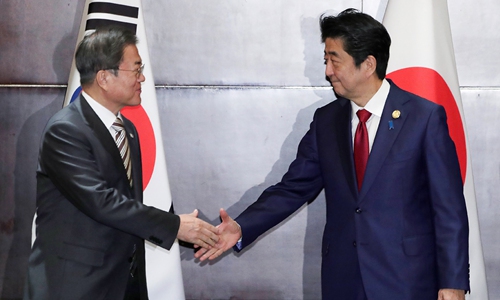HOME >> OPINION
Meeting shows tensions between S.Korea and Japan going down as attitudes soften
By Zhou Yongsheng Source:Global Times Published: 2019/12/26 16:58:04

South Korean President Moon Jae-in (Left) shakes hands with Japanese Prime Minister Shinzo Abe during their meeting in Chengdu, Southwestern China's Sichuan Province, on December 24, 2019. Photo: AFP
The eighth China-Japan-South Korea leaders' meeting recently held in Chengdu in Southwest China's Sichuan Province, gave Tokyo and Seoul an important chance to mend fences. Whether the two East Asian countries can seize the opportunity will be a test of their diplomatic sagacity and point to the future of regional economic policiesAs Japan tightened export controls on some high-tech materials pivotal to South Korea's semiconductor industries in July, bilateral relations went into a tailspin. After rounds of negotiations, there have been few signs of tensions going down. Against this backdrop, talks between leaders of Japan and South Korea at the trilateral meeting came under intense spotlight.
South Korea's Supreme Court in 2018 ordered Japanese companies to compensate Koreans forced to work in Japanese factories during WWII, while Japan claims all wartime reparations were paid in keeping with the 1965 Treaty on Basic Relations signed by two countries. The South Korean government said it cannot alter the decision of the court, therefore it cannot meet Japan's demand by solving divergences via diplomatic means.
However, Seoul has shown a sense of wisdom by not withdrawing from the General Security of Military Information Agreement (GSOMIA). Moon and Abe held talks at the 22nd ASEAN Plus Three Summit in Bangkok in November, which only lasted for 10 minutes and failed to achieve a thaw in ties.
Moon's participation in the trilateral summit showed his eagerness to improve relations with Japan by communicating with Abe.
Japan's attitude toward South Korea has softened to some extent. Tokyo approved the export of the first batch of the three minerals key to making semiconductors and display panels to South Korea in August and September. On December 20, Japan eased its curbs on exports of one of the three semiconductor materials.
The 45-minute meeting between Moon and Abe shows both sides intend to create goodwill, but wouldn't make concession on frictions. Abe demanded that Seoul offer a solution to the forced labor issue, while Moon hoped that Tokyo would roll back its export control measures.
Though the bilateral talks raise hopes for a thaw in ties, both countries dither on making concessions to the other.
China has spared no effort to provide a chance to its two neighbors to improve ties. The two East Asian countries have grabbed the opportunity, yet failed to resolve substantial issues, an indicator of the complexity of the issue.
A document titled "Trilateral Cooperation Vision for the Next Decade," and another on the "China-Japan-South Korea+X" early achievement outcomes were released during the trilateral meeting. The three countries will push for the signing of the Regional Comprehensive Economic Partnership as scheduled in 2020 and work together to speed up the China-Japan-South Korea Free Trade Agreement negotiations. At a joint press briefing after their meeting, Moon and Abe expressed readiness to play constructive roles in denuclearization of the Korean Peninsula.
All this indicates that frictions between Japan and South Korea have not affected their cooperation in Northeast Asia.
The trilateral leaders' meeting in Chengdu has achieved positive outcomes, but all substantial issues have to be carefully implemented in 2020. Japan and South Korea should show tolerance toward their rifts. This will contribute to improvement in ties.
The author is professor in the Institute of International Relations at China Foreign Affairs University. opinion@globaltimes.com.cn
Posted in: ASIAN REVIEW